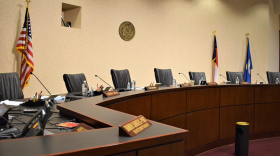A North Carolina House committee voted Wednesday to give voters a chance to remove the Jim Crow-era literacy test requirement from the state’s constitution.
Voters haven’t had to take the test since the 1960s — when federal civil rights rules invalidated the requirement — but an effort to take the language out of the constitution was voted down in 1970.
Lawmakers tweaked the proposed ballot language Wednesday to make sure voters understand the requirement’s racist history. Some worry the change could again be defeated if people think it’s about whether voters should be able to read.
Rep. Sarah Stevens — a Republican from Mount Airy and one of the measure’s sponsors — said her goal is “to get to where people understand it’s not about being able to read and write.”
Democratic Rep. Kelly Alexander of Charlotte reminded his colleagues of the requirement’s history. He said it was added to the constitution shortly after white supremacists violently overthrew a racially diverse group of elected officials in Wilmington in 1898.
Alexander said the literacy test “was instituted primarily to cut down on the ability of African American citizens to be able to vote.”
The House has voted to put the amendment on the ballot before, but the Senate didn’t take up the proposal. This year, Senate leader Phil Berger has voiced support for the change.
“I do believe the stars might be aligning this year for us to finally get this done and move on from what’s happened in the past,” said Rep. Terry Brown, one of the bill’s sponsors. “And I do think it’s incumbent on all of us on both sides to of the aisle here to make sure we’re going back into our districts and informing our constituents.”
Packed House here in the Judiciary 2 Committee as we wait for HB 44 to be heard. Let’s FINALLY Repeal the Literacy Test. First step in the process for this year. #ncpol #ncga #CLT pic.twitter.com/bYRW9PS7hk
— Rep. Terry Brown Jr. (@TerryBrownCLT) March 1, 2023
If both the House and Senate approve the measure, the proposed amendment will be on the November 2024 ballot. The bill goes next to the House Rules Committee.







